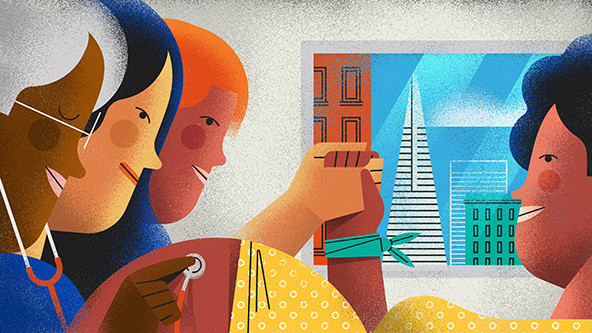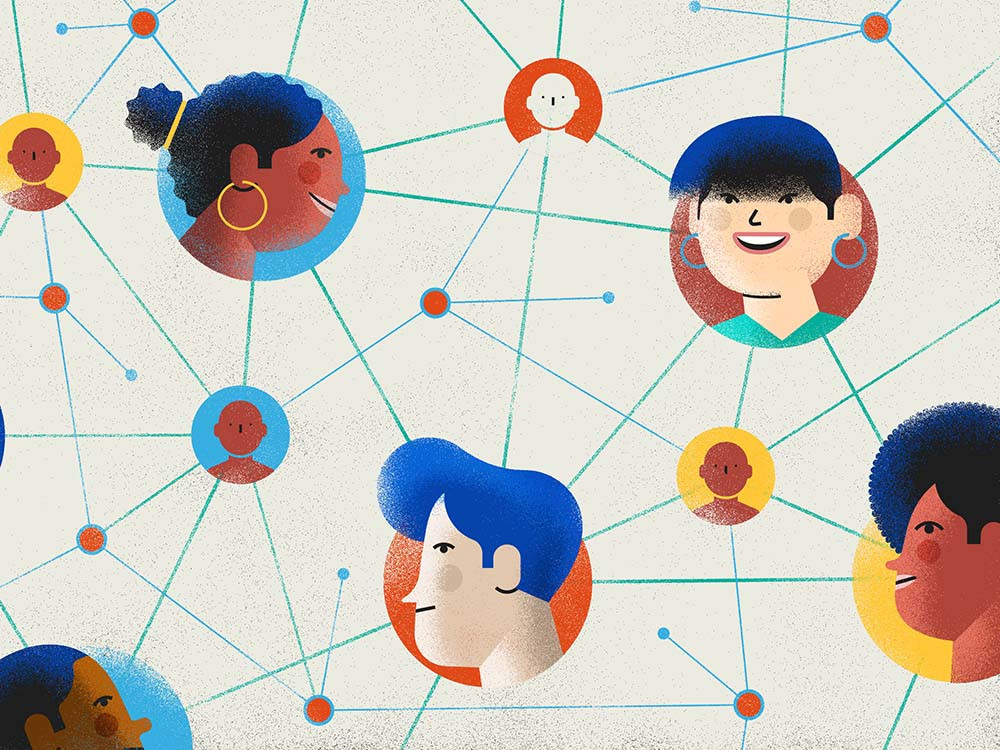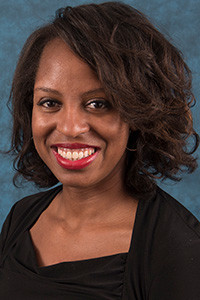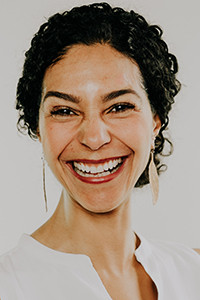 (Illustration by Hugo Herrera)
(Illustration by Hugo Herrera)
After years of working as a pediatrician in safety-net clinics in San Francisco, Dr. Zea Malawa recognized that her clinical care of Black and Brown families often didn’t address the root of what ailed them. Rather, she was treating the social and health consequences of racism.
To create a better future for children across San Francisco, Malawa began to focus on policy and broader systems change. She’s now the executive director of Expecting Justice, a Black-led, cross-sector initiative that addresses system challenges that Black and Pacific Islander women face during pregnancy and childbirth.

In the following conversation with Miya Cain, senior consultant with the mission-driven consulting firm FSG and a partner in the early implementation of Expecting Justice, Malawa discusses the process of centering anti-racism in Expecting Justice’s work and the importance of having anti-racist expertise among the leaders of collective impact efforts, including both the backbone team and initiative’s steering committee. The backbone team, which is dedicated to aligning and coordinating the work of a collaborative, is one of the “five conditions” of collective impact. The backbone team leads the work, in partnership with a steering committee of representatives from across the community who guide and champion the effort more broadly.
This interview has been edited for clarity and length for Stanford Social Innovation Review. In the full conversation, Cain and Malawa discuss how to weave an anti-racist approach into the collective impact framework, and how Malawa and her colleagues have helped deepen their partners’ understanding of the impacts of structural and interpersonal racism. Listen to a podcast of the complete interview below and follow this series for new conversations and essays about collective impact.
Miya Cain: Could you tell us a little about yourself, Zea, and what brought you to this work?
 Miya Cain
Miya Cain
Zea Malawa: I've been a pediatrician for over a decade, and my practice has always been in safety-net clinic settings. Eight or nine years into practicing medicine, I started to feel really heartbroken because it was clear that what I could bring to my patients in the clinical setting was not getting at the problem that was ailing them. I was working with a lot of Black and Brown families, and many of them were experiencing the social and health consequences of racism. What is very frustrating is that vaccines have no impact on discrimination in schools, and telling parents to keep their kids’ car seats facing backward until age 2 does nothing to help parents protect their kids from police violence.
 Zea Malawa
Zea Malawa
Bearing witness to systemic racism and the toll that it was taking on kids, and seeing parents who were so helpless to protect their kids from this racism, it really started to impact my health and well-being, especially being a Black mom myself and being able to relate so closely to these parents. I quit my practice, got a master’s in public health, and when I came out, I was really clear that I wanted to try to produce great health for kids of color by trying to center systems change as a mechanism.
Miya Cain: Could you tell us more about Expecting Justice?
Zea Malawa: Expecting Justice is a collective impact effort. Our team at the San Francisco Department of Public Health and University of California, San Francisco, started this in 2017 and wanted to address racial disparities in preterm or premature births within the city of San Francisco. For people who don’t know, preterm birth is when a baby is born before 37 weeks of pregnancy. Preterm birth rates are very disparate depending on your racial background. In fact, maternal health outcomes, in general, are some of our most shameful and upsetting health disparities in this country.
When I was interviewing for the job of leading the backbone organization, I was really explicit that if I got this job, I wanted to address racism as a root cause of these disparities. Although I'm a physician, I didn’t want to talk about clinical interventions. I didn’t even want to talk about how we could help people get to prenatal care earlier. I really wanted to talk about some of the racialized experiences that I know Black, birthing people were having that were creating stress, which was leading to the adverse maternal health outcomes. I wanted to talk about things like economic exclusion and high rates of racialized unemployment in this country. I wanted to talk about the criminal justice system and gentrification. That’s what I wanted to talk about if we were going to create birth justice.
Miya Cain: Could you help people understand how the effort is structured and who is involved in the work?
Zea Malawa: Because this is a health-based issue, people want to default to having primarily people in the health-care sector guiding the work. Creating the steering committee that would guide the work gave us the opportunity to really be intentional about bringing people from some of the other areas that might impact birthing people. So, we have people from early childhood. We have people from social services, including a human services agency. Of course, we have doula agencies and a doula nonprofit represented. We have the Federal Reserve Bank represented, which has been really interesting and amazing because they bring some very outside-the-box ideas. And then, of course, we do have some of the major birthing hospitals and the department of public health represented as well. We also have San Francisco Unified because the school district touches so many of our parents and families. It’s really important that they're involved in solutions.
But maybe most importantly who’s on our steering committee are Black and Pacific Islander mamas, who are also the prioritized populations that our collective impact effort is focused on.
If you want to actually create anti-racist change, you need to have a deep understanding of the problems so that your solutions can actually fix what’s broken. In order to understand the problem and all of its nuances, the best experts are the people who live that life every day.
We pay our mamas on our steering committee $100 an hour. That makes perfect sense to me although I know a lot of people balk. If you were doing a research study and you needed to hire a statistician and they were charging $100 an hour in San Francisco, that probably would not be surprising, and you would probably pay it because you recognize that you need that expertise. It’s no different with our community experts.
Miya Cain: I'm over here snapping, Zea, for all of it. I want to step back a little bit and ask you why collective impact was a helpful framework for this project.
Zea Malawa: When you think about racism, this organizing principle that has guided the development of this country for over four centuries, it can feel really huge and overwhelming. Collective impact provides a framework or a series of steps to figure out how you take little bite-size pieces of this really giant problem and turn them into a meaningful solution that might create something significant for the people that you're working with and for.
If you're doing antiracist work, the process of intentionally creating a common agenda is inevitably going to force you to not only get on the same page around solutions but get on the same page about problems.
Having the opportunity to build a common agenda, having an opportunity to think about how we’re going to hold ourselves accountable through shared measurement, gives us an opportunity to unpack some racist assumptions that we have when it comes to doing social service work. It also gives us an opportunity to level set around what our understanding of the problem is and what our understanding of the solution is. In particular, to be able to convene folks who have the lived experience of navigating racism every day with folks who are in charge of major systems and institutions is pretty powerful. The set of bridges that you’re building can eventually become something very powerful if you can successfully align those two spheres of understanding.
Miya Cain: The problem of racism is such a huge problem and such a deeply rooted problem, and the challenge of inequities in birth outcomes is huge. Could you explain the core strategies of Expecting Justice?
Zea Malawa: In order to answer that I'm going to talk about how we got there. We had to spend eight months with our steering committee, consisting of relatively progressive, liberal-thinking institutional leaders, really making sure that people actually understood what racism is, what health equity means, and what it might look like on the ground.
Part of that work was helping people find their bravery to think about doing something big and ambitious and outside of the box because we don’t yet have a lot of evidence-based solutions for dismantling racism. I think that for the last 20 years, so much of the nonprofit world has been pushed to be data-driven that the idea of taking on something that is not evidence-based felt really, really scary to many of our steering committee members. We had to make peace with the idea that if we actually wanted to create a meaningful impact, we were going to have to go way out on a limb.
Our first initiative was increasing access to doula care. Part of that is building an accessible doula program that can offer doula services to birthing people at no cost. We also conduct anti-racist doula trainings and this is a little bit more outside the box because we are providing funding to train Black and Pacific Islander birthing people and other folks from those communities to support one another through doula work. We’re intentionally bringing critical and anti-racist practices into the doula training so that when our doulas come out, they’re not only able to support people during birth, but they're able to help mamas navigate and respond to racism when it occurs in a clinical setting.
Even that is not enough, so we have been working on introducing legislation in coalition with stakeholders. Under the leadership of California State Senator Nancy Skinner, our group delivered the California Momnibus bill (SB 65) this year, which is a suite of bills focused on advancing birth justice in the state. And beginning in 2022, doulas will be a Medicaid-covered benefit in our state, and the governor will fund a guaranteed income program that prioritizes pregnant Californians.
Second, we do anti-racism skills-building work across the city with people in health care, school districts, public health providers, and others. That’s different from implicit bias training. It is probably even different than a diversity, equity, and inclusion training. What we’re trying to do is teach the hard skills that people need in order to practice anti-racist behavior and create anti-racist policies and practices in our institutions. How can we teach you to give and receive feedback about racism? How can we teach you to engage the community in a meaningful way so that they can have a say on the budget that you're putting together? We hope trainees gain a new ability to take action, shift their behavior, and hold themselves accountable to authentic change.
Our last initiative, and the one that is maybe most ambitious and untested, is called the Abundant Birth Project. In the United States, it is the first guaranteed income program for pregnant people. Through this pilot program we are giving pregnant Black and Pacific Islander people $1,000 a month starting as early in pregnancy as we can and lasting through six months postpartum. We’ll be piloting that over three years. We hope the new budget provisions associated with Momnibus can serve as a pathway for scaling and sustaining this guaranteed-income pilot.
Miya Cain: With this range of work, how are you measuring the progress and impact, or in collective impact terminology, the “shared measures”?
We have had a difficult time finding the right shared metrics to measure our anti-racist impact. You can find data that measures individual-level health behaviors and health outcomes. Conversely, it can be difficult to find data measuring systems change. As a result, you run the risk of pigeonholing your collective impact solutions into individual-level efforts because that’s the only kind of impact you can measure.
We’ve been using a results-based accountability framework for our shared measures, and this approach demands that we assess, not only, how much we did, but also is anybody better off as a result of us doing it. It gets very tricky to measure if anybody is better off because there might be data available on who got to prenatal care and when, but what you can’t find data on is “Did they have a positive, affirming, dignified experience in prenatal care?”
Miya Cain: Could you talk a little bit more about the importance of a backbone organization and what it actually does to make an initiative like this run?
Zea Malawa: When I was first brought on to lead our backbone organization, I had the pleasure of having a collective impact coach because I wasn’t familiar with the framework when I first got hired into the role. She taught me a lot about what it was going to take to run a successful collective impact effort, and when we were talking about the role of the backbone, I was encouraged to support the effort from the background.
But the problem is, if you’re trying to do anti-racism work, not a lot of people have a strong anti-racist vision, particularly people who are established in their fields and maybe leaders of their institutions. It’s hard to become a leader of your institution if you’re deeply anti-racist in your approach. I have found being anti-racist is generally not compatible with promotions, and so we can’t just assume that institutional leaders are going to be able to lead an anti-racist collective impact effort. Presumably, if they could, we wouldn’t have so much racism in our institutions. Therefore, part of the job of the backbone is to push people out of their comfort zones and help people consider things that they haven’t considered before.
Miya Cain: I’m hearing the importance of the backbone having anti-racist expertise and also the backbone not being neutral. It’s important for the backbone to have a strong vision and a strong perspective, and to be steering the group toward a north star.
Zea Malawa: Exactly. As a leader, I was agnostic on the specific solutions that we came up with, but I was very opinionated on whether we were having an anti-racist impact. So, as we were trying to identify solutions, if it felt like we were identifying a solution that was not going to have the impact that we had stated in our common agenda, it was my job to name that issue, but it was not my job to automatically throw out this or that solution.
Miya Cain: So important. Zea. I’m also curious how you’ve thought about the cultural and relational parts of this work.
Zea Malawa: One thing that I will name is that you have to be in relationships in order to be able to grow your empathy around issues of race and racism, and that can be sometimes hard because, in general, professional culture in the United States encourages us to maintain a certain level of emotional distance in your work relationships, and to not bring too much emotion and emotional nuance. So, it can be confusing, hard, and frankly it can feel uncomfortable for a lot of people to show up to collective impact in a different kind of way and so we’ve tried to use tools to help people.
One of the things that you brought, Miya, to our very first collective impact meeting with our steering committee was the idea to bring in elders from the community. So, if you recall at the very first meeting, we brought four elders, Black women who live in San Francisco. We had asked them ahead of time to write us a little something about what brought them to San Francisco when they were girls and what dream they have for themselves, and then to write about what dream they have for their great grandchildren. Starting the whole steering committee grounded in the dreams of these Black matriarchs of our community set a very different tone than any other Department of Public Health meeting that I’ve ever attended.
Miya Cain: What has most surprised you about this work?
Zea Malawa: One thing I will say that was unexpected is how ill-equipped the collective impact framework was, at least at the time, to create equitable solutions. I think it was a little bit surprising how many blind spots the initial framework had. Even just when putting together our steering committee, the initial charge was to find institutional leaders, which makes sense because they are the decision makers, but when you think about how structural racism works, inevitably you’re mostly recruiting people of racially privileged backgrounds.
I think on the other side, something that has been surprising in a really good way is how excited people have been about this work. We are four years in and so many of our original steering committee members continue to come back and continue to feel excited. I think that they are feeling the changes that we’re making, and they can see that, together, we’re having an impact.
Miya Cain: Is there anything else you would like to share for people who are really trying to incorporate anti-racism into their work?
Zea Malawa: Dismantling racism is really hard work. Keeping cynicism at bay requires a ton of energy. So I want to remind people why we need collective impact initiatives to invest that kind of emotional labor: Simply put, as a Black mom, I live with the unfortunate reality that I alone do not have the power to keep my son safe. I need everybody else’s help to keep my baby safe. When one in 1,000 Black men in this country die because of police violence, all of us Black moms, we need your help. This is a genuine plea from me on behalf of myself and all of the other moms of color out there who just want their kids to have their fair share of daylight, and grow up to be the happy, wonderful, healthy human beings they were always meant to be. On all of our behalf, I’m requesting that everybody doesn’t just do the easy thing but digs into the hard work because our kids deserve the opportunity to live and thrive. If we can work collectively on the hard stuff, an equitable future, where families of all racial backgrounds flourish, will be within our grasp.
Listen to a podcast of the complete interview and follow this series for new conversations and essays about collective impact.
Support SSIR’s coverage of cross-sector solutions to global challenges.
Help us further the reach of innovative ideas. Donate today.
Read more stories by Zea Malawa & Miya Cain.

